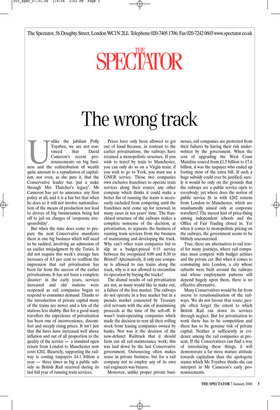The wrong track
Unlike the jubilant Polly Toynbee, we are not con vinced that David Cameron’s recent pronouncements on big business and the redistribution of wealth quite amount to a repudiation of capitalism, nor even, as she puts it, that the Conservative leader has ‘put a stake through Mrs Thatcher’s legacy’. Mr Cameron has yet to announce any firm policy at all, and it is a fair bet that when he does so it will not involve nationalisation of the means of production nor lead to droves of big businessmen being led off to jail on charges of ‘corporate irresponsibility’.
But when the time does come to prepare the next Conservative manifesto there is one big business which will need to be tackled, involving an admission of an earlier misjudgment by the Tories. It did not require this week’s average fare increases of 4.5 per cent to reaffirm the impression that rail privatisation has been far from the success of the earlier privatisations. It has not been a complete disaster: in the early years, services increased and old stations were reopened as rail companies began to respond to consumer demand. Thanks to the introduction of private capital many of the trains are newer and a few of the stations less shabby. But for a good many travellers the experience of privatisation has been one of inconvenience, discomfort and steeply rising prices. It isn’t just that the fares have increased well above inflation and out of all proportion to the quality of the service — a standard open return from London to Manchester now costs £202. Bizarrely, supporting the railway is costing taxpayers £4.1 billion a year — three times as big a public subsidy as British Rail received during its last full year of running train services. Prices have only been allowed to get out of hand because, in contrast to the earlier privatisations, the railways have retained a monopolistic structure. If you wish to travel by train to Manchester, you can only do so on a Virgin train; if you wish to go to York, you must use a GNER service. Those two companies own exclusive franchises to operate train services along their routes; any other company which thinks it could make a better fist of running the trains is necessarily excluded from competing until the franchises next come up for renewal, in many cases in ten years’ time. The franchised structure of the railways makes a complete nonsense of the decision, at privatisation, to separate the business of running train services from the business of maintaining and developing the track. Why can’t other train companies bid to slip in a budget-priced 8:15 service between the overpriced 8:00 and 8:30 to Bristol? Alternatively, if only one company is allowed to run trains along the track, why is it not allowed to streamline its operation by buying the tracks?
The dismal results of rail privatisation are not, as many would like to make out, a failure of the free market. The railways do not operate in a free market but in a pseudo market concocted by Treasury civil servants with the aim of maximising proceeds at the time of the sell-off. It wasn’t train-operating companies which made the decision to rent all their rolling stock from leasing companies owned by banks. Nor was it the decision of the now-defunct Railtrack that it should farm out all rail maintenance work; this was laid down by the last Conservative government. Outsourcing often makes sense in private business, but for a rail company not to employ any of its own rail engineers was bizarre.
Moreover, unlike proper private busi nesses, rail companies are protected from their failures by having their risk underwritten by the government. When the cost of upgrading the West Coast Mainline soared from £1.5 billion to £7.6 billion, it was the taxpayer who ended up footing most of the extra bill. If such a huge subsidy could ever be justified, surely it would be only on the grounds that the railways are a public service open to everybody; yet where does the notion of public service fit in with £202 returns from London to Manchester, which are unashamedly aimed only at corporate travellers? The merest hint of price-fixing among independent schools and the Office of Fair Trading closed in. Yet when it comes to monopolistic pricing on the railways, the government seems to be blithely unconcerned.
True, there are alternatives to rail travel for many journeys, where rail companies must compete with budget airlines and the private car. But when it comes to commuting into London, a city whose suburbs were built around the railways and whose employment patterns still depend hugely upon them, there is no effective alternative.
Many Conservatives would be far from averse to renationalisation of the railways. We do not favour that route; people often forget the extent to which British Rail ran down its services through neglect. But for privatisation to work there has to be competition and there has to be genuine risk of private capital. Neither is sufficiently in evidence among the rail companies at present. If the Conservatives can find a way of introducing these things, it will demonstrate a far more mature attitude towards capitalism than the apologetic stance which Ms Toynbee thinks she can interpret in Mr Cameron’s early pronouncements.





































 Previous page
Previous page